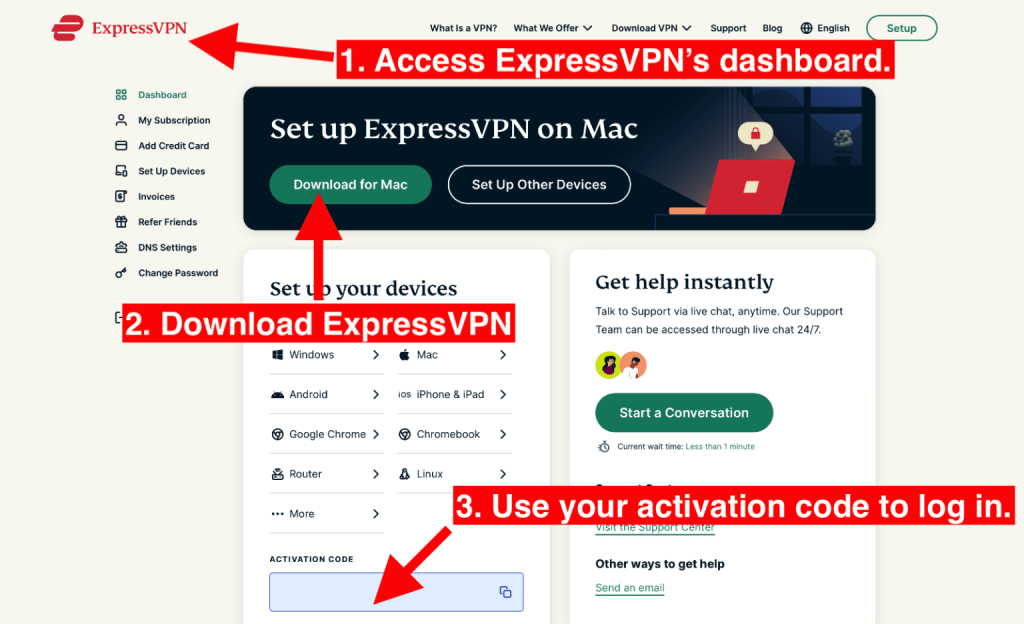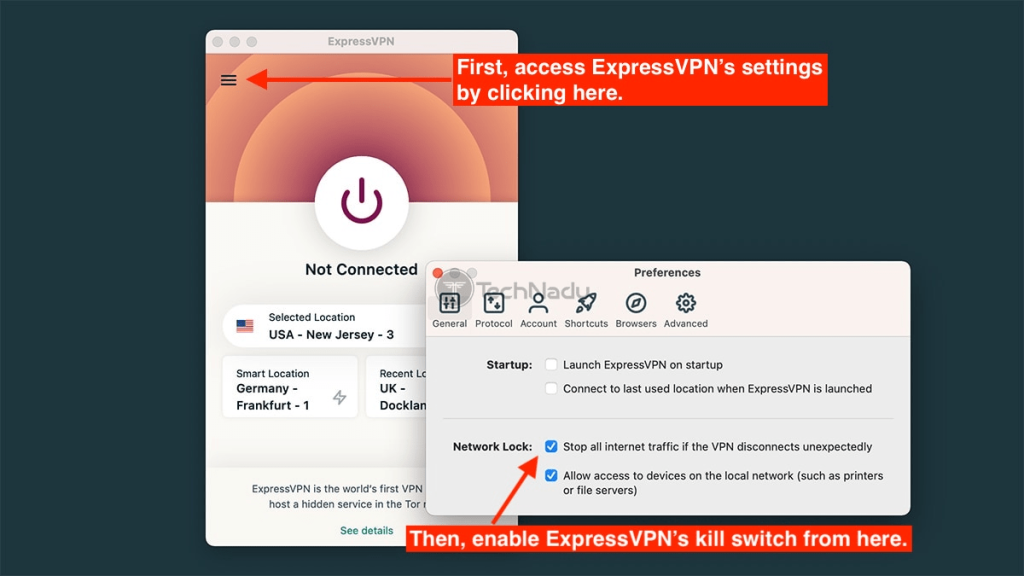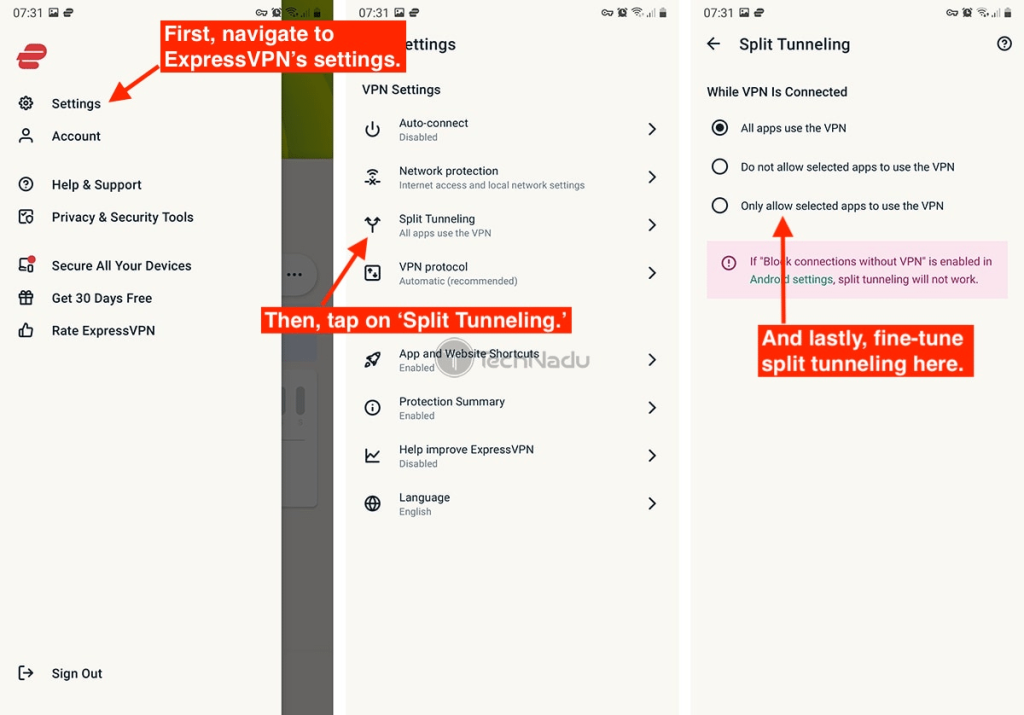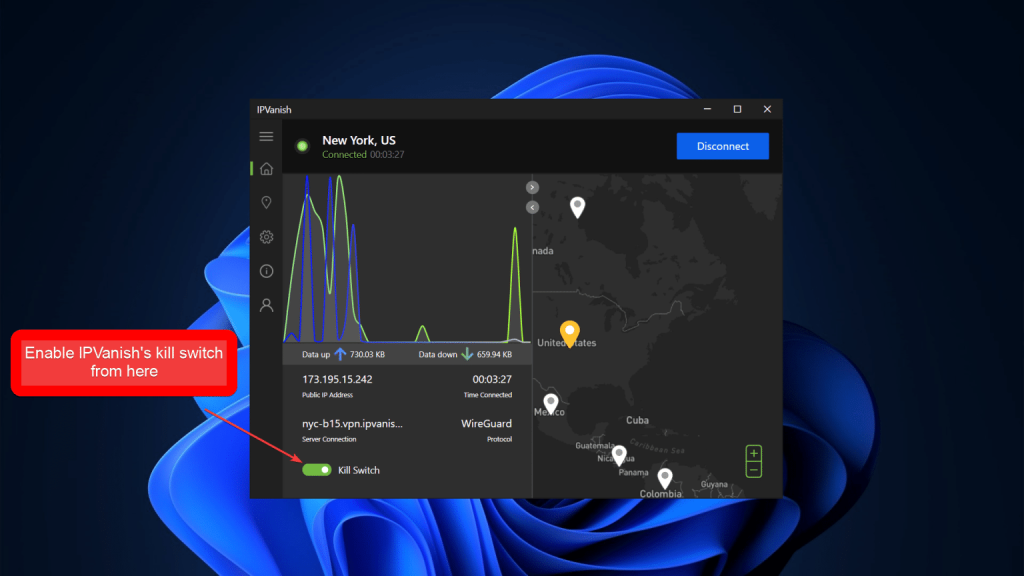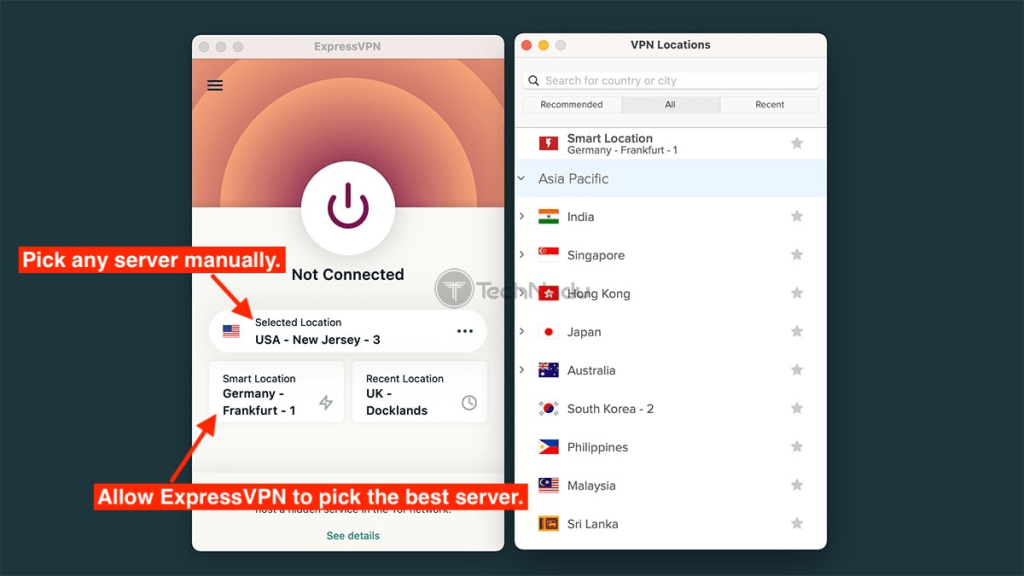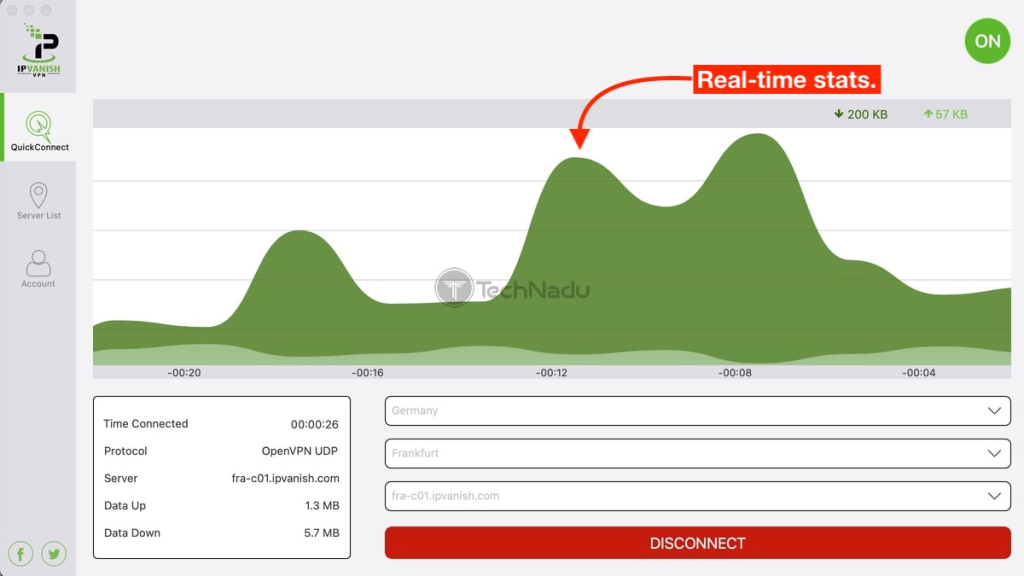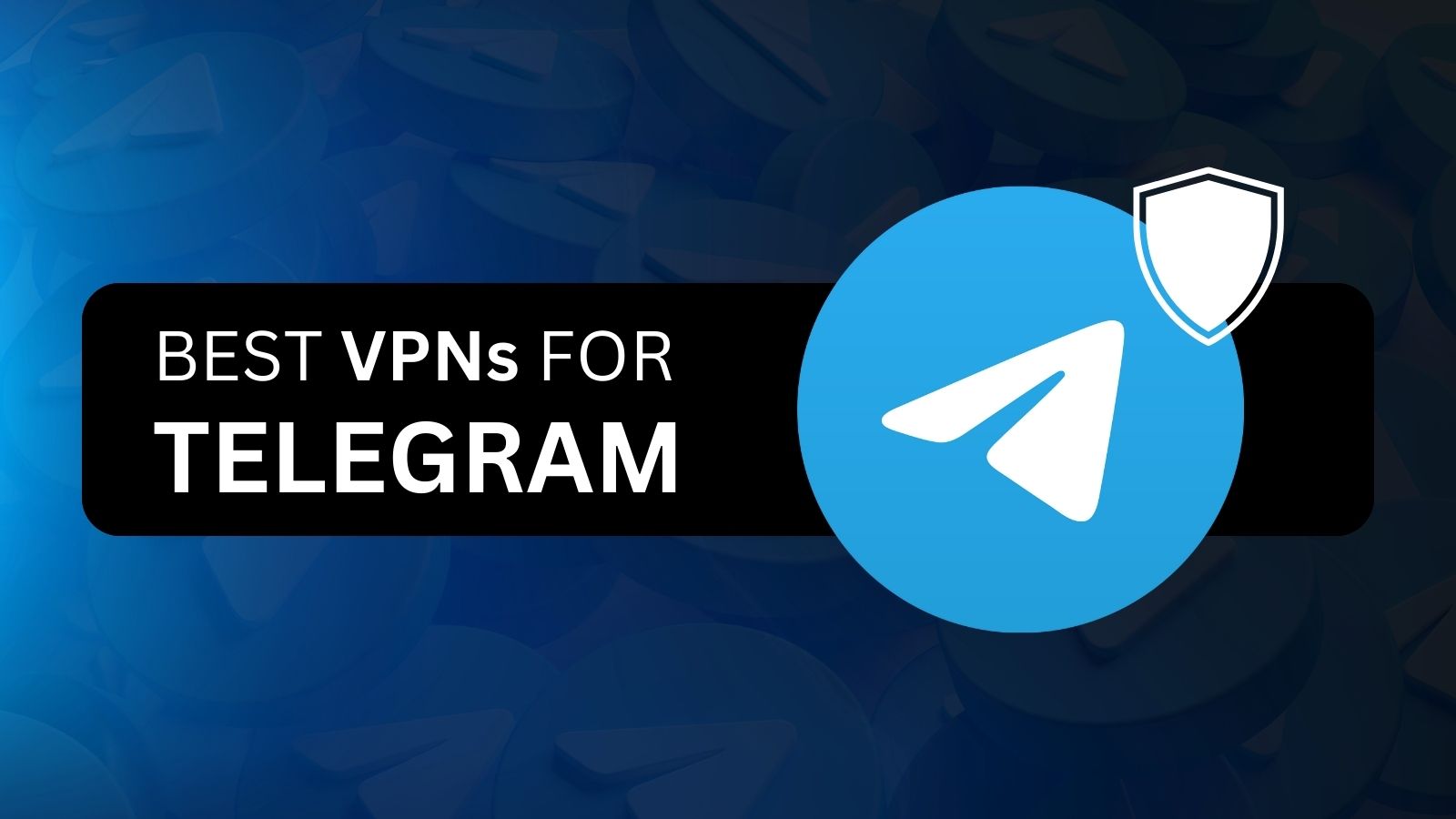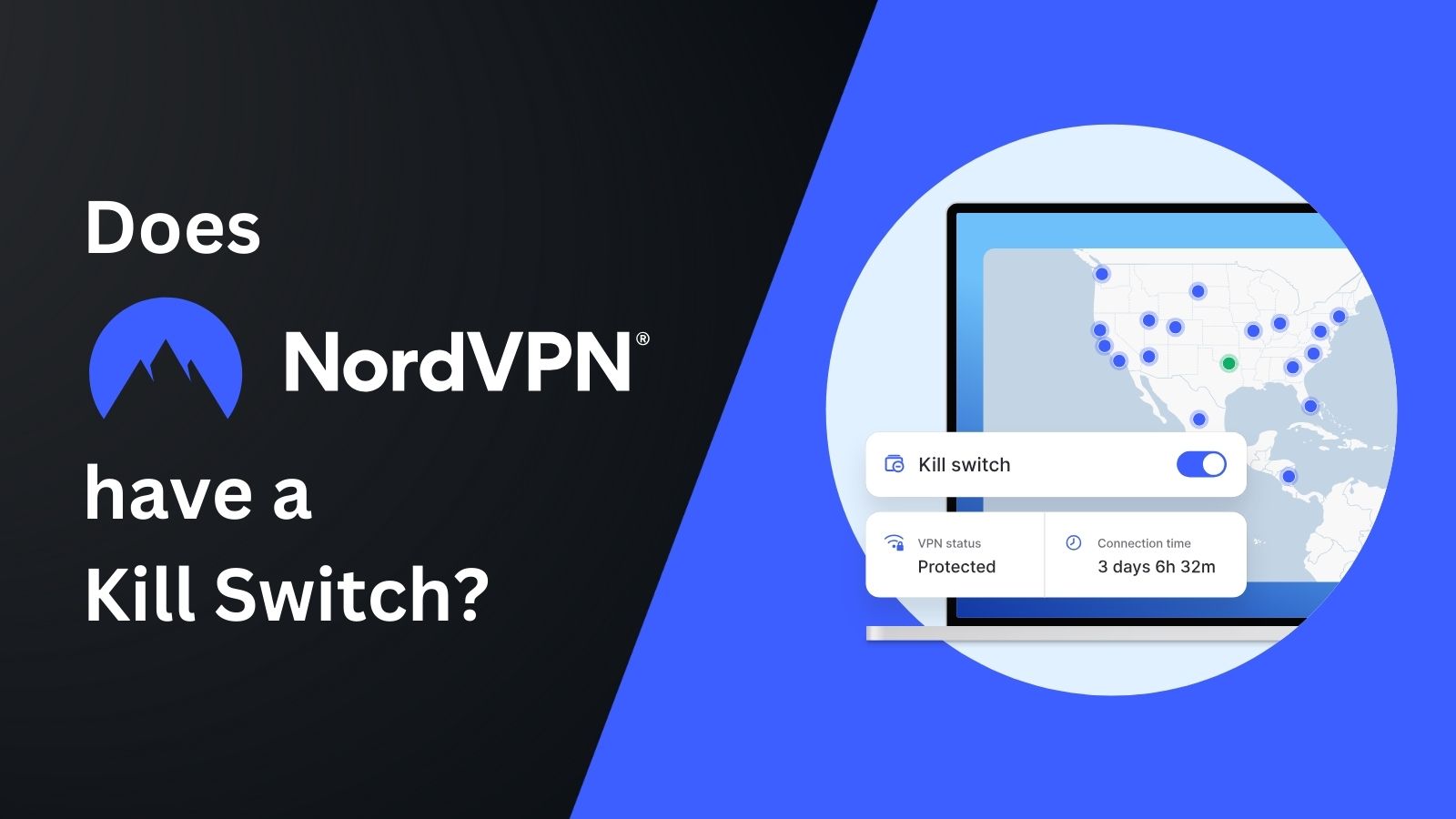When you purchase through links on our site, we may earn an affiliate commission. Here’s how it works.
ExpressVPN vs. IPVanish 2025
Our experts have reviewed 53 VPN providers, which were put through extensive rounds of testing. To learn more about that process, here’s how we review VPNs, where we explain our criteria and our policy of being fully transparent.
If you’re looking for the best VPN service in today’s market, you’ve probably heard of ExpressVPN and IPVanish. Both services offer top-of-the-line security features, excellent unblocking capabilities, and reliable customer support. However, choosing between the two VPNs can be challenging, so we’ve decided to help you with our ExpressVPN vs IPVanish comparison.
ExpressVPN is renowned for its fast speeds, strong encryption, and user-friendly interface. It’s a top choice for browsing, streaming, and torrenting, receiving positive reviews worldwide. IPVanish, on the other hand, offers a configurable app, emphasizing security with advanced features like OpenVPN Scramble. IPVanish offers competitive pricing, making it an excellent choice for those on a budget.
As you’ll see in this IPVanish vs ExpressVPN comparison, both VPNs offer a good combination of security, privacy, and media support. Still, some key differences make them better suited for different users. To make it easier to compare the two VPNs, let’s take a look at some of their most prominent features.
In this in-depth comparison, we’ll delve deeper into the similarities and differences between the two VPNs and find out what each VPN offers.
More specifically, we’ll evaluate them based on their jurisdictions, supported devices, prominent features, customer service, ease of use, pricing, and more, so you can decide which VPN suits your needs best.
If you want to learn how the two VPNs fare in a specific area, you can jump to that section using the table of contents below. However, we advise you to read the whole article to make an informed decision quickly and confidently. That said, let’s dive into the comparison and see which VPN reigns supreme.
Background, Jurisdiction & Reputation
The security and privacy of your data and online activities heavily depend on the VPN you choose. It’s important to choose a VPN service outside the 5/9/14-Eyes Alliance with no track record of privacy incidents. Let’s examine how each VPN compares in that aspect.
ExpressVPN (Score - 9/10)
ExpressVPN has been around since 2009 and is based in the British Virgin Islands. The jurisdiction has no mandatory data retention laws and isn’t part of any intelligence-sharing alliance. This means that ExpressVPN can maintain a strict no-logs policy as it isn’t legally obligated to log users' activity or share their data with authorities.
In 2021, ExpressVPN was acquired by Kape Technologies, a company that was previously known for its contentious marketing practices. However, the company has expanded its portfolio of security products lately and acquired leading VPN services like Private Internet Access (PIA), CyberGhost VPN, and ZenMate VPN.
ExpressVPN frequently undergoes independent security audits and has passed all previous audits with flying colors. Its no-logs claims have also been tested and verified in court via real-world incidents. In December 2018, Turkish authorities seized one of ExpressVPN’s servers to investigate the assassination of Russian Ambassador Andrey Karlov. However, the service held true to its no-logs policy and couldn’t provide any user data.
IPVanish (Score - 7/10)
IPVanish was launched in 2012 by Mudhook Media, a subsidiary of Highwinds Network Group, headquartered in Florida, USA. Since the jurisdiction is part of the 5 Eyes intelligence alliance, the US government can legally demand data from IPVanish on its users. However, IPVanish states that it doesn’t keep any logs and has recently undergone a third-party audit to confirm this claim.
In 2016, IPVanish was involved in a controversy, confirming that the VPN was used to log some personal data. It handed over user logs to the US Department of Homeland Security, even though it claimed to have a no-logs policy. The incident led to a loss of users’ trust in the VPN.
However, IPVanish has changed ownership twice and has significantly evolved its management policies since then. The service first became part of StackPath when it acquired the Highwinds Network Group in 2017. It’s currently owned by VIPRE Security Group (part of Ziff Davis Inc.) and has undergone an independent security audit, which confirmed compliance with its Privacy Policy.
Who's the Winner? - ExpressVPN
Based on our analysis, ExpressVPN emerges as the clear winner in this category. It has a more positive reputation and regularly undergoes independent audits.
While IPVanish has undergone changes in ownership and claims to have implemented improved security and privacy measures, it still falls short in comparison to ExpressVPN. Therefore, you should get ExpressVPN to ensure the best security and privacy practices for your online activities.
Supported Platforms & Devices
The ability to support various devices and platforms is critical for a VPN. Let’s see which service comes out on top in this round of IPVanish vs ExpressVPN comparison.
ExpressVPN (Score - 10/10)
ExpressVPN provides excellent compatibility across a range of devices and platforms. It provides native apps for desktop and mobile platforms, including Windows, Linux, macOS, Android, and iOS. It also offers extensions for Chrome, Firefox, Safari, and Edge browsers.
In addition, ExpressVPN supports a range of routers, including popular brands like Linksys, Asus, and Netgear. The company also offers its own router called ExpressVPN Aircove, making it stand out from other VPN services. Plus, ExpressVPN has dedicated apps for streaming devices such as Fire TV and Android TV.
It also offers a MediaStreamer feature that allows you to use ExpressVPN on devices that don’t natively support VPN clients, like Apple TV and gaming consoles. However, ExpressVPN only supports up to 5 simultaneous connections, which is significantly less than IPVanish. If you want to protect all your devices at once, you can set up ExpressVPN on your router.
IPVanish (Score - 8/10)
IPVanish offers a wide range of dedicated apps for desktop and mobile platforms, including Windows, macOS, iOS, Android, and Linux. Unlike ExpressVPN, you don’t get any browser extensions. One notable feature of IPVanish is its unlimited simultaneous device connections, allowing you to connect as many devices as you want using a single subscription.
Additionally, IPVanish is compatible with some routers and provides manual setup guides for several popular models, including DD-WRT, Tomato, and ASUS routers. If you prefer a pre-installed and pre-configured router, IPVanish offers that option through its partner, FlashRouter.
IPVanish also offers native apps for Amazon Fire TV and Android TV, making it a good choice for streaming geo-blocked content on your TV.
Who's the Winner? - ExpressVPN
Both ExpressVPN and IPVanish offer robust support for various platforms and devices, but ExpressVPN edges ahead slightly with its wider support for routers and browser extensions.
Therefore, you should get ExpressVPN if you prioritize VPN compatibility across a wide range of devices and browsers.
Installation & Initial Configuration
Installation and initial configuration can be daunting for some VPN users. In this section, we’ll compare how easy it is to install and configure ExpressVPN and IPVanish on your device.
ExpressVPN (Score - 10/10)
ExpressVPN offers a simple installation process for all devices, including desktops, mobile devices, and routers. You can find detailed installation guides for each platform, making the process even simpler.
For desktops, you get dedicated apps for Windows, Mac, and Linux. The interface is user-friendly, so you can connect to a VPN server with a few clicks. Moreover, the installation process for mobile devices is equally effortless, with dedicated apps available on the App Store and Google Play Store.
ExpressVPN also provides installation guides for all popular devices. While the process can vary depending on your device model, the instructions are clear and easy to follow.
IPVanish (Score - 10/10)
Much like ExpressVPN, IPVanish offers a simple installation and configuration process that doesn't require any technical expertise. You can download the VPN client from the official website and follow the installation wizard guides to complete the setup process.
Setting up both desktop and mobile devices is also relatively quick, taking less than five minutes to complete. However, the user interface isn’t as straightforward as ExpressVPN's. Nonetheless, you get comprehensive guides and easy-to-follow instructions for all platforms and devices, including routers.
Who's the Winner? - It's a Tie!
Based on our analysis, it appears that both ExpressVPN and IPVanish have an easy and straightforward installation process. Therefore, it’s hard to choose a winner in this section.
If you get ExpressVPN, you gain access to a wealth of troubleshooting resources and guides that will assist you in getting started with the service smoothly. Similarly, if you get IPVanish, you can set up and start using the VPN within minutes.
Prominent Features
Each VPN service offers distinct features to cater to your needs. In this section, we’ll examine the standout features of the two VPNs and how they impact your online experience.
ExpressVPN (Score - 9/10)
ExpressVPN is packed with numerous features to help you strengthen your privacy and security online. It includes an automatic kill switch that ensures that your data remains secure in case your VPN connection drops. This VPN also provides reliable protection against IPv4 and IPv6 leaks, ensuring that your actual IP address remains hidden when connected to the VPN.
Its split tunneling feature allows you to route some traffic through the VPN and let other traffic access the Internet directly. ExpressVPN doesn't offer dedicated/static IP addresses or an ad blocker. However, it offers unlimited bandwidth and data usage with no caps, making it a reliable option for extensive streaming and browsing.
ExpressVPN also includes an anti-tracking system called Threat Manager that’s designed to prevent apps and websites from communicating with third-party trackers. Additionally, the service now offers a premium password manager, ExpressVPN Keys (in beta), with every subscription. It can securely store and manage your passwords and provide an extra layer of protection for your online accounts.
IPVanish (Score - 6.5/10)
IPVanish offers all the basic features of a good VPN. It provides a kill switch and split tunneling functionality, although their availability differs across platforms. For instance, the kill switch works on Windows, Android, and macOS, while split tunneling is limited to Android and Fire OS devices.
What distinguishes IPVanish is its Scramble feature, which adds obfuscation to your OpenVPN traffic and allows it to bypass VPN blocks and firewalls. While ExpressVPN also offers obfuscation on its servers, there’s no way to tell when you’re connected to obfuscated servers. IPVanish also stands out with its unlimited simultaneous device connections.
Like ExpressVPN, IPVanish lacks an ad-blocker and static/dedicated IP addresses. The absence of dedicated IP addresses may not be a dealbreaker for most users, but if you need access to a network using a single IP address every time, you might want to explore alternative VPN options.
Who's the Winner? - ExpressVPN
While IPVanish’s unlimited simultaneous device connections make it an attractive choice, ExpressVPN takes the lead with its extensive range of features that are uniformly available across its apps.
It has a more extensive server network and goes the extra mile with advanced features like Threat Manager and ExpressVPN Keys. Therefore, you should get ExpressVPN to enjoy a comprehensive feature set and elevate your online experience.
Server Count & Infrastructure
The number of servers and their locations can significantly impact the speed and overall performance of a VPN. Let’s see which VPN wins this round of IPVanish vs ExpressVPN comparison.
ExpressVPN (Score - 8.5/10)
ExpressVPN has an extensive network of over 3,000 servers in 94 countries and 160 locations around the world. This means that you can connect to a wide range of server locations and expect fast and reliable speeds. ExpressVPN’s server network also includes obfuscated servers that can bypass Internet restrictions and censorship. However, there’s no way to manually connect to these servers.
Additionally, ExpressVPN has begun upgrading its server network by swapping out its 1Gbps servers for blazing-fast 10Gbps servers. This upgrade allows for a substantial improvement in the speed and overall performance of the VPN. With the new servers, you can expect reduced buffering, seamless streaming, and faster download speeds.
In addition to the server upgrade, ExpressVPN also allows unlimited server switching. This means you can switch between servers and locations as many times as you want without any restrictions. This flexibility allows you to optimize your VPN connection for speed without making in-depth technical adjustments.
IPVanish (Score - 7/10)
IPVanish has a network of over 2,000 servers across more than 50 countries and 75+ locations. Unlike ExpressVPN, it lacks virtual VPN servers, which are servers that appear to be located in one country but are actually hosted in another. Most VPN providers offer virtual servers in locations with poor Internet infrastructure or invasive data retention laws.
Similar to ExpressVPN, IPVanish also owns its entire server network, so there are no third parties involved. It lacks dedicated servers for streaming, gaming, or torrenting, but its overall performance and speed make it a viable option for these activities.
Who's the Winner? - ExpressVPN
When it comes to server count and infrastructure, ExpressVPN has a clear advantage over IPVanish. With more servers and server locations, ExpressVPN has more options to choose from and offers better connectivity and faster speeds.
While ExpressVPN doesn't offer dedicated servers for streaming and torrenting, you won't face any issues with these activities when you get ExpressVPN, thanks to their reliable 10Gbps servers.
UI/UX Design & Ease of Use
A VPN's interface and ease of use can make or break your experience with the service. In this section of the ExpressVPN vs IPVanish comparison, we’ll examine how each VPN fares in terms of design, navigation, and overall user experience.
ExpressVPN (Score - 10/10)
ExpressVPN has a user-friendly interface that’s easy to navigate for both beginners and experienced VPN users. Both desktop and mobile apps have sleek and modern designs with a large on/off button on the main screen. This makes it easy to connect to the VPN server of your choice with just a few clicks.
The app also comes with a set of convenient and user-friendly features. For example, it has a built-in speed test that allows you to check the speed of different servers on Windows and macOS. Similarly, you can check for IP and DNS leaks within the app.
Aside from user-friendly features, ExpressVPN apps allow a high level of customization. You can set up favorites for frequently used servers, making it easy to access them with a single click. Moreover, you can choose between automatic protocol selection or manually selecting your desired protocol for more control over your VPN connection.
IPVanish (Score - 7.5/10)
IPVanish’s interface may not be the most modern-looking, but it’s easy to use. The home screen displays the user's current location and provides a one-click connect button to establish a connection to the VPN server. On the left sidebar, there are a series of tabs you can check out.
The Quick Connect tab in the sidebar lets you choose a country and even select a city and individual server. As you connect to a server, your actual IP address and geo-location information are replaced by IPVanish’s virtual IP address on the home screen. You also see a graph showing information about your VPN session, including connection speed and bandwidth.
However, the interface design and functionality of both the desktop and mobile apps could be improved. Also, the app's desktop version lacks some of the advanced features available in the mobile version. One notable example is the split tunneling feature, which is available on Android but not included in desktop apps. The app's layout could also be more intuitive, making it more accessible to first-time VPN users.
Who's the Winner? - ExpressVPN
The focus on simplicity and functionality over aesthetics gives ExpressVPN an edge over IPVanish’s visually appealing client. The polished interface ensures effortless navigation and a seamless VPN experience.
Therefore, our recommendation is to get ExpressVPN if you prefer a well-designed interface that enhances your VPN usage.
Media Streaming, Torrenting & Gaming Support
VPNs do more than just protect your privacy. They also help you unblock streaming services, enjoy uninterrupted gaming sessions, and download torrents anonymously. Let’s take a closer look at how the two VPNs perform in these areas.
ExpressVPN (Score - 10/10)
ExpressVPN provides excellent support for media streaming, allowing seamless access to a plethora of platforms, including Netflix, Hulu, Amazon Prime Video, and BBC iPlayer. Its MediaStreamer feature allows streaming on devices that don’t natively support VPNs. However, you must register your IP address on the ExpressVPN website to be able to use the feature.
There are no dedicated servers for torrenting, but ExpressVPN allows P2P traffic on all servers. It also doesn’t support port forwarding, which can be an essential feature for certain torrenting setups. Despite the lack of these features, ExpressVPN still provides a secure environment for torrenting activities through solid privacy and military-grade encryption.
In terms of gaming, ExpressVPN is a suitable choice due to its fast speeds and reliable connections. Whether you’re playing locally or connecting to remote servers, ExpressVPN’s network will minimize your ping and latency to reduce delays and ensure responsive gameplay.
IPVanish (Score - 8/10)
IPVanish is a good VPN for media streaming, with the ability to access all major streaming services. However, it doesn’t work as reliably as ExpressVPN on some platforms, such as Hulu and Amazon Prime Video.
IPVanish also allows torrenting on all its servers. While downloading P2P files isn’t against this VPN’s terms of use, keep in mind that IPVanish originates from the USA, which has a rigorous stance regarding copyright infringement. Therefore, we strongly advise sticking to legal torrent websites.
Like ExpressVPN, IPVanish doesn’t offer any dedicated gaming servers, but you can fine-tune your connection to achieve a better gaming experience. IPVanish's SOCKS5 proxy also offers an efficient solution for IP address privacy, providing faster speeds without encryption. It's perfect for streaming and gaming, where high-speed connections are essential.
Who's the Winner? - ExpressVPN
Based on our testing, ExpressVPN provides a superior online experience compared to IPVanish. With its MediaStreamer feature and servers already optimized for streaming, gaming, and torrenting, ExpressVPN ticks most of the boxes in this category.
So get ExpressVPN if you want to unlock a world of seamless entertainment and endless gaming possibilities like never before.
Security & Privacy
Apart from being able to unblock content, another important reason to use a VPN is for the added privacy and security it provides. In this round of ExpressVPN vs IPVanish comparison, we’ll delve into the encryption levels, protocols, logging policies, and other relevant aspects to help you pick the right VPN service.
ExpressVPN (Score - 9.5/10)
ExpressVPN uses AES 256-bit encryption, which is currently the most secure encryption standard on the market. It also supports a series of capable protocols, including OpenVPN, IKEv2, and L2TP/IPSec. Additionally, ExpressVPN has designed a proprietary protocol called Lightway, which is optimized for fast speeds without sacrificing your privacy.
In terms of logging policy, ExpressVPN is a strict no-logs service, which means it doesn’t log any information that could be used to identify you or your location. It also operates under the British Virgin Islands' jurisdiction with no mandatory data retention laws, further enhancing your privacy.
ExpressVPN regularly undergoes independent security audits to ensure its system is secure. By using TrustedServer technology, ExpressVPN minimizes the risk of your data falling into the wrong hands. The company achieves this by running its server network entirely on RAM. When a RAM-only server is rebooted or powered off, all its data is deleted, leaving no trace of your online activities behind.
IPVanish (Score - 9/10)
IPVanish comes with a controversial history that doesn’t benefit its current security and privacy stance. As mentioned earlier, although it's a no-logs service now, the company did cooperate with law enforcement in 2016. However, IPVanish has since changed ownership and made changes to its Privacy Policy. It has also undergone an independent security audit that verified its no-logs policy.
This VPN uses AES 256-bit encryption and supports several protocols, including OpenVPN, WireGuard, IPSec, and IKEv2. You also get an OpenVPN Scramble feature, which aims to address the challenges of censorship and deep packet inspection (DPI). This feature lets you disguise your OpenVPN traffic as normal HTTPS traffic. By doing so, you can evade VPN detection in regions where VPN traffic is closely monitored or blocked.
Unlike ExpressVPN, IPVanish doesn't offer RAM-only servers, which could be a drawback if you seek the highest level of security and privacy.
Who's the Winner? - ExpressVPN
Both ExpressVPN and IPVanish offer a similar level of encryption and a wide range of protocol support. However, ExpressVPN's jurisdiction and use of RAM-only servers make it a more secure option.
ExpressVPN’s dedication to security is reinforced by regular independent audits that test and verify its systems and practices. Therefore, you should get ExpressVPN if you want unparalleled security for all your online activities.
Speed & Performance
VPNs can have a significant impact on your Internet speed, so it’s important to choose one that provides smooth and reliable performance. Let’s see how the two VPNs compare in this segment.
ExpressVPN (Score - 10/10)
ExpressVPN has consistently been one of the fastest VPNs available on the market. In our speed test, we got fast and reliable connections, with an average speed reduction of only 12.4%. While this may seem like a significant drop at first glance, it's relatively low compared to other VPNs.
Moreover, the company’s efficient server infrastructure allows for swift server connections. Thanks to the use of parallel connections, connecting to servers usually takes only a couple of minutes.
Even on remote servers, we got excellent speeds with no significant lag or speed reduction. This is partially due to its proprietary Lightway protocol, which is optimized for fast speeds and better security.
IPVanish (Score - 4/10)
IPVanish shows significant variations in terms of speed and performance. In contrast to ExpressVPN, it had a much higher average reduction in speed, at 78.2%. On remote servers, such as those in India and the USA, the reduction in speed was as high as 99.6% and 96.5%, respectively.
While IPVanish has relatively low connection speeds, you can still use it for your favorite online activities as long as you’re connected to the right server. However, if you prioritize fast speeds and more reliable connections, you should consider choosing ExpressVPN instead of IPVanish.
Who's the Winner? - ExpressVPN
ExpressVPN is a clear winner in this category due to its fast speeds and excellent performance. Whether you’re connecting to a nearby or distant server, ExpressVPN ensures a stable and reliable connection.
So, if you prefer lightning-fast speeds and reliable performance, you should get ExpressVPN.
Customer Support
The level of support provided by a VPN service can significantly impact your VPN experience. Whether you're a novice or a seasoned VPN user, it's necessary to have access to reliable assistance when you need it. This section of the IPVanish vs ExpressVPN comparison will delve into the support services offered by each VPN.
ExpressVPN (Score - 10/10)
ExpressVPN provides several customer support options. You can access 24/7 live chat support for quick and efficient assistance. The company also offers a support ticket system and a detailed knowledge base with frequently asked questions and troubleshooting guides.
In addition, ExpressVPN provides setup guides for various devices, even those that aren’t VPN-friendly. The company also runs a blog that’s frequently updated with useful information related to VPNs and online security. Lastly, ExpressVPN offers a free Udemy course that covers security and privacy essentials. You don’t need to be an ExpressVPN subscriber to enroll.
IPVanish (Score - 10/10)
IPVanish offers much of the same support features as ExpressVPN. You get 24/7 live chat support to speak with customer support representatives directly. The company also provides an extensive knowledge base that covers a wide range of topics, including setup guides, troubleshooting, and more.
Similar to ExpressVPN, IPVanish runs an often-updated blog covering the latest news and security essentials. Overall, IPVanish support is reliable, with a responsive team to help you with any issues or concerns.
Who's the Winner? - It’s a Tie!
As you can see in this ExpressVPN vs IPVanish roundup, both VPNs have a lot in common. They provide reliable and comprehensive support, with a variety of options to choose from. If you get ExpressVPN, you can rely on immediate assistance through live chat and email. Additionally, it provides an extensive knowledge base that contains helpful guides and resources.
Similarly, if you get IPVanish, you’ll have access to a dedicated team of knowledgeable representatives and ample resources to troubleshoot VPN-related issues.
Pricing
When it comes to choosing a VPN, it’s critical to find the right balance between features and cost. Let’s compare the various subscription plans offered by ExpressVPN and IPVanish to see which VPN provides the best value for money.
ExpressVPN (Score - 9/10)
ExpressVPN is a premium service with prices on the higher end compared to other VPNs. If you’re looking for the best value, you can opt for the annual plan with a lucrative deal of 3 free months. The 1-year plan is priced at $99.95 for the entire year, which brings the monthly cost down to just $6.67/month.
If you prefer a shorter commitment, ExpressVPN offers a monthly plan for $12.95, which turns out to be the most expensive plan. You also get a 6-month plan for $59.95, which is equivalent to $9.99 per month. All plans come with the same features and are protected by a 30-day money-back guarantee.
The service supports multiple payment options, including credit cards, PayPal, Google Pay, and cryptocurrencies for anonymous payments. ExpressVPN also provides a 7-day free trial on Android and iOS. You won't be charged if you cancel before your 7-day trial ends. If you want further information, we recommend checking out our ExpressVPN free trial guide.
IPVanish (Score - 7.5/10)
IPVanish offers three subscription plans that are more affordable than ExpressVPN. The 2-year plan is the most cost-effective option and saves you 72% on the monthly plan. It’s priced at $70.99 for 2 years, which equates to $2.96 per month.
If you want to go for a shorter plan, you can choose the monthly plan priced at $11.99. IPVanish also offers an annual plan for $39.99, or $3.33 per month. Keep in mind that you’ll be charged the regular rate ($89.99) after the first year.
It’s important to add that IPVanish only protects its long-term plans with a 30-day money-back guarantee. Additionally, your subscription must come from IPVanish’s website to qualify for a refund. If you subscribe through its Android or iOS app, you’ll need to turn to Google or Apple.
When it comes to payment options, IPVanish accepts four methods, including credit cards, PayPal, Google Pay, and Amazon Pay.
Who's the Winner? - ExpressVPN
Both ExpressVPN and IPVanish offer diverse payment plans, but ExpressVPN is the winner as it covers all its plans with a generous 30-day money-back guarantee. In contrast, IPVanish offers a refund within 30 days only on its long-term plans.
ExpressVPN also provides anonymous payment options in the form of cryptocurrencies, such as Bitcoin and Ethereum. Therefore, if you prefer foolproof security with anonymous payment options, we recommend that you get ExpressVPN.
IPVanish vs ExpressVPN - Which One Is Better?
After careful consideration and analysis of the features, pricing, and performance of both VPNs, it’s evident that ExpressVPN is the winner in this comparison.
To understand why, let’s take a look at the individual scores of each VPN in different categories based on the reviews published on our website.
While IPVanish also offers solid features at a competitive price, ExpressVPN simply delivers a more polished and well-rounded experience. It has an extensive server network, top-notch security features, and user-friendly apps. The fact that it undergoes regular security audits further reassures its commitment to users’ privacy and security.
And even though IPVanish offers more budget-friendly subscription plans, its lack of advanced security features, sluggish speeds, and somewhat clunky UI makes it a less attractive option. Therefore, if you’re looking for the best overall VPN experience, we highly recommend ExpressVPN.
You’ve reached the end of our ExpressVPN vs IPVanish comparison. If you have any questions or concerns, let us know in the comments below. Thanks for reading!

